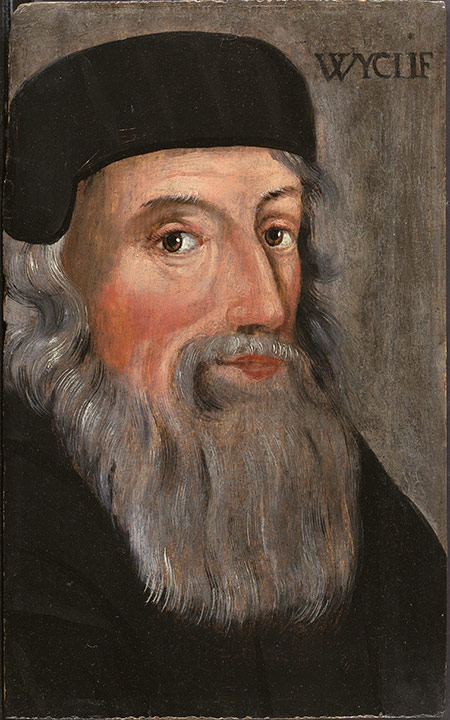Margery Baxter of Martham and the Lollards
In the mid 15th century Lollards was the name given to those who followed the religious teachings of John Wycliffe* and were encouraged greatly by the translation of the Bible into the English language, (from Latin), which the common man could understand for the first time. The Lollards basic beliefs were opposed to the wealth of Catholic clergymen and the practice of confession to church officials. They were against the imagery and richness of the church and opposed fees charges by the clergy for religious oaths and ceremonies like baptisms.
Margery Baxter of Martham was a well-known follower of the Lollards and the established church accused her of being heretic. She did not believe that the sacraments of the church were necessary for redemption. This created quite a sensation in Martham and beyond.
In October 1429 Margery was put on trial at Norwich. A Johanna Clifland testified against her stating, amongst other things, that she had expressed a variety of unorthodox sentiments, including speaking out against the traditions of sanctioned marriage, fasting for religious days and the swearing of religious oaths. He accused Margery of telling a friend that the bread consecrated in the mass was not the very body of Christ. Baxter stated that:-
“You believe ill because, if every such sacrament is God and the true body of Christ, there are countless gods because a thousand and more priests every day make a thousand such gods and afterwards eat these gods and, having eaten them, discharge them through their posteriors into repulsively smelling toilets, where you can find plenty of such gods if you want to look. Therefore, know for certain that that which you call the sacrament of the altar will never by the grace of God be my God, for such a sacrament was falsely made and deceitfully ordained by priests in the church to induce idolatry in simple people because this sacrament is only material bread”.
Baxter also went on to argue that “the images which stand in the churches come from the Devil so that the people worshipping those images commit idolatry”. Then, echoing foundational Lollard beliefs, she also opposed the wealth of Catholic clergymen and the practice of confession to church officials.
However, despite such statements and confessions, Margery was sentenced not to be burnt, but to receive four Sunday floggings as she walked barefoot on four successive Sundays around her parish church and two more in a market place and to present herself with other penitents to do ‘solemn penance in Norwich Cathedral on the next Ash Wednesday and Maundy Thursday.’
Some men found common cause with women and provided support. During her trial it was said that Margery carried a Lollard preacher’s books from Yarmouth to her home at Martham. Hawisia Mone from Loddon was also tried at Norwich and said Margery often opened her house at Martham to ‘scoles of heresie’ (an opinion or a doctrine at variance with established religious beliefs).
This did not stop her expressing her opinions, however, and she left Martham with her husband to live in Norwich.
Bishop Alnwick of Norwich made records of Margery Baxter’s trial that are fuller than the records held at Companies House. He recorded that Margery Baxter was unlike anyone else in the fifteenth-century record of persecution. The deposers, especially her neighbour Joan Clyfland, relate a long discourse by Margery, given (they claim) while she, Joan, and Joan’s servants were sewing in front of the fire. Baxter was a fervent disciple of the preacher William White, who worked from Kent up the eastern coast of England. She had housed him, transported and hidden his books and revered him as a saint. She invited Clyfland and the servants to her house for her husband’s night-time readings of ‘the law of Christ’ – another brief but vivid illustration of the context and importance of communal reading.
Rev. Thomas Hitton
Thomas (died 1530) was said to be a parish Priest at Martham(1). He is generally considered to be the first English Protestant martyr of the Reformation, although the followers of Wycliffe – the Lollards – had been burned at the stake as early as 1519.
Hitton(2) believed in the supremacy of the Scriptures. He also argued that, whilst baptism was necessary and marriage was good, neither had to be done by a priest or in a church and that baptism “would be much better if it were spoken in English”.
Hitton had joined William Tyndale and the English exiles in the Low Countries. He returned to England on a brief visit in 1529 to contact the supporters of Tyndale and to arrange for the distribution of smuggled books such as the first English Psalter translated by George Joye. He was seized near Gravesend, Kent on his way to the coast to take a ship and found to be in possession of letters from the English exiles. He was then arrested on the grounds of heresy, interrogated and probably tortured. He was condemned by Archbishop William Warham and by John Fisher, Bishop of Rochester, and burned at the stake at Maidstone on 23rd February 1530.
Archbishop Thomas More described Hitton as “the devil’s stinking martyr” and took a personal interest in the case and criticized George Joye for canonizing Hitton.


*John Wycliffe was a philosopher, theologian, biblical translator, reformer, priest and professor at Oxford University. He became an influential dissident within the Roman Catholic priesthood during the 14th century. He attacked the privileged status of the clergy, which had bolstered their powerful role in England. He also attacked the luxury and pomp of local parishes and their ceremonies. He supported the translation of the bible into everyday English that common people could understand and he promoted the Protestant faith.
Sources:
(1) Norfolk Records Office at Norwich.
(2) Foxe’s Book of Martyrs — 446. THOMAS HITTON, MARTYR (exclassics.com)